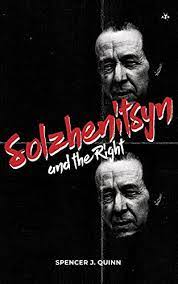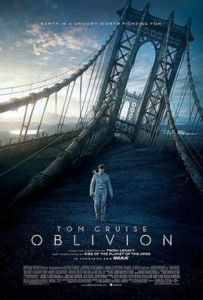Oblivion
It’s always nice when the stars align for a particular film, even when the planets and everything else in the sky do not, and the stars in question are hard to see. Regarding the 2013 Tom Cruise science fiction film Oblivion, one telescope reveals 4D levels of Eurocentric defiance against the modern world, while another tells us that such conclusions are probably the signs of an overzealous critic. The film could also be seen as a subtle allegory for the Jewish Question — one profound enough to even provide an answer. In any event, Oblivion offers two hours of inspiring — if somewhat uneven — entertainment, which will be hard to forget once one connects all the twinkling dots in the sky, regardless if the filmmakers had put them there on purpose.
Going for Oblivion is an intriguing premise. The year is 2077. 60 years earlier, aliens blew up the Moon and wiped out half of humanity in the resulting planetary cataclysms. After the invasion, however, the Earthlings fought back and won the war, but at the cost of rendering Earth nearly uninhabitable. This forced the survivors to migrate to a massive triangular space station called the Tet, and then, ultimately, to Titan, one of the moons of Saturn.
Cruise’s character — given the refreshingly goyish moniker of Jack Harper — remains on Earth as a technician whose job is to keep the Tet’s battle drones functional. These drones protect the Tet as well as the numerous hypothermal engines which convert seawater to fusion energy for the colony on Titan. Remnants of the alien army, known as scavengers, continue to menace the Tet, which is why Harper and his communications officer Victoria (played by Andrea Riseborough) must remain ever-vigilant upon their base of operations/dream home floating in the clouds. Of course, these two are lovers, and they are counting the days until they can finally emigrate to Titan. They appear to be the last two humans on Earth — or, at least, on their part of Earth, which, in a homage to the original Planet of the Apes, includes several iconic artifacts of New York City.
Tom Cruise turns in a muted, yet suitably macho performance. His character is prone to risk-taking and he harbors a rebellious, heroic spirit, which jeopardizes Victoria’s peace of mind and rosy plans for their future. Yet, neither he nor director Joesph Kosinski overdoes it. Oblivion often broods upon Harper’s psychology through recurring dreams and suppressed memories, thus rendering incongruous the devil-may-care cockiness of so many of Cruise’s other film personas. Also, Harper finds that he doesn’t exactly want to leave Earth. He’s built himself a secret cottage by a lake where he can kick back all alone in his Yankees cap while listening to classic rock on his turntable. Not what one would expect from Tom Cruise, yet he makes the adjustment with aplomb — especially when he can’t shake the feeling that he remembers a certain beautiful woman from before the war.

You can buy Spencer J. Quinn’s Solzhenitsyn and the Right here.
Other selling points of Oblivion include the arresting post-apocalyptic set design, the slick airborne tech, and the filmmakers’ judicious use of computer-generated imagery. I’d say nearly a quarter of the film has Cruise tramping or flying over the Eastern Seaboard’s devastated terrain. It is a haunting thing to witness. Cinematographer Claudio Miranda’s washed-out palette of mainly white, silver, and blue leaves a lasting impression as well.
Thus we have the film’s scenario. It’s a little ominous, a little weird. A little off. With a title such as Oblivion, how could it not be? Imagine the desolation of Moon, the sexuality of Passengers, the grittiness of The Road Warrior, and the inscrutability of Andrei Tarkovsky’s Solaris all in the Potemkin Petrie dish that is The Truman Show. Yet it is all believable. Barely. That is, until something happens.
Since I find Oblivion worthwhile for both cinematic and metapolitical reasons, I am loath to give spoilers. After several curious — not to mention dangerous — events, Jack Harper effectively red-pills himself. He notes how only he and not Victoria suffers from strange memories. He also notes how only he and not Victoria seems prepared to alter his thinking and his life to accommodate new, and perhaps taboo, information. He further understands how going down this road not only jeopardizes everything he’s worked for, but his and Victoria’s lives as well.
Is this sounding familiar? Is this not the beginning of the road many dissidents have taken towards the radioactive clarity of ethnocentrism, racism realism, and the Jewish Question? Stopping here, however, would not be enough to make Oblivion special. After all, such creepy existential trauma is at least as old as The Matrix — and you could probably go as far back as Coma, Invasion of the Body Snatchers, or even The Stepford Wives — to say nothing of countless science fiction novels — for earlier mind-bending antecedents.
What makes Oblivion special is its appeal to a latent, perhaps even atavistic, nationalism as an antidote to the enigmatic mind virus which possesses Jack Harper. At one point, after engaging with scavengers in the ruins of the New York Public Library, he chances upon an old copy of Thomas Macaulay’s Lays of Ancient Rome. Later, he thumbs his way to the famous passage in which Horatius defends a bridge against his people’s enemies:
Then out spake brave Horatius,
The Captain of the Gate:
‘To every man upon this earth
Death cometh soon or late.
And how can man die better
Than facing fearful odds,
For the ashes of his fathers,
And the temples of his Gods . . .
This makes a strong impression on Harper, one that he keeps hidden from Victoria. But this is only part of a larger theme of recapturing the greatness of past civilizations. Harper’s little library in his hidden bungalow contains many dusty, hardbound classics, most prominently A Tale of Two Cities. Yes, Gabriel Fauré’s Requiem or Antonín Dvořák’s American string quartet might have served the film’s purpose a little better than Procol Harum’s “A Whiter Shade of Pale” or Led Zeppelin’s “Ramble On.” But hey, I guess classic rock is called “classic” for a reason.
Regardless, Harper refers to ashes and temples a few times throughout the film, especially at the end. So this is certainly a feature of Oblivion rather than a bug. Further, the theme of reclaiming past glory is clearly Eurocentric (read: white) and comes out pure and completely without irony. It’s not as if Harper boogies down to Marvin Gaye or the Commodores at his lakeside retreat, or inserts hip-hop Ebonics into his everyday speech, or gets it on with whomever stands in for Gong Li these days. It’s also not as if Oblivion makes some heavy-handed analogies to Apartheid or Jim Crow laws. Even the misanthropy found in 2001: A Space Odyssey is completely absent. No, this is a film by whites, for whites, and implies quite strongly that white people and the civilizations they created are — wait for it — good.

You can buy Trevor Lynch’s Classics of Right-Wing Cinema here.
And I checked. The creative team — from director to screenwriters to cinematographer — consists entirely of white goys. Maybe this isn’t entirely the case with the money people, but you can’t have everything. Olga Kurylenko, who plays the mystery woman from Harper’s past, does seem vaguely Asian. But she isn’t, at least according to her Wikipedia page. In the film, she comes across as exotic and Eastern, but still white.
As for the Jewish Question, Oblivion evokes the frightful state of mind one enters when confronting it. The insidious forces acting behind the scenes in this film resemble Frankfurt School intellectuals who paint natural and healthy impulses of whites as fascist, authoritarian, and evil. They effectively pit their victims against each other, with one side fighting for an attractive ideology based on lies, and the other for its very survival. Meanwhile, said insidious forces grow stronger in the wake of all the fighting. This is Oblivion in a nutshell, whether the filmmakers realize it or not.
The one squirt of fudge in this all-vanilla sundae, of course, is Morgan Freeman. If there ever was an example of a token Negro, Oblivion’s Freeman character is it. On balance, its effect is not terrible. Yes, Freeman is a bland actor who has made a career out of reprising the non-threatening personas found in Driving Miss Daisy and The Shawshank Redemption. Tommy Lee Jones or J. K. Simmons would have brought much more personality and dynamism to the table. Oblivion does suffer somewhat from Freeman’s presence. Yet, if you aim to satisfy a particular studio’s demand for diversity and still wish to appeal to conservative white people, who better to cast than Morgan Freeman? Seriously, just about any other mature black actor — Lawrence Fishburne, Danny Glover, and Ving Rhames, to name a few — would have signaled an attempt to lure black people into the movie theaters. Morgan Freeman does not lure black people into movie theaters. Quite the opposite, I would imagine.
The way they dress Freeman up head to toe in guerrilla gear, complete with leather goggles, and often film him in a dark, hazy underground bunker, you can’t even tell he’s black half the time. The following insight goes beyond the script and perhaps even the producers’ intentions, but the casting of such a famously anodyne Negro amounts to a subliminal message to white audiences: He is a swarthy stand-in for one of you. This is reinforced not only by the fact that everyone else appearing in the film is white, but also by the way in which the male characters invariably take the lead and the female characters invariably let them. Oblivion is, in a word, based.
Yet, Oblivion is by no means a masterpiece. It works better as a concept than on film as an extrapolation of a possible future. And the metapolitical connections I draw are a tad slender, I admit. At times Harper makes questionable decisions, as do the filmmakers, when it comes to plot. If the planet is still crawling with dangerous scavengers, why is there only one technician to fix drones over such a large area? And how can this technician expect to not be molested by aliens as he jams to groovy tunes in his secluded cabin? Also, the film seems to suffer more for not living up to its potential than for any of its noticeable flaws. I’m sure Christopher Nolan or Ridley Scott could have channeled Stanley Kubrick to turn in an unforgettable three-and-a-half-hour epic on the nature of man and machine in the modern world. Instead, we get a two-hour product which, despite being a pretty cool ride, comes across as a tad packaged.
This isn’t the worst of flaws, but there it is. Still, Oblivion possesses a stout occidental heart and, inadvertently or not, puts a twinkling north star in the sky for racially-aware white people to follow. That alone is enough to make it special.

* * *
Counter-Currents has extended special privileges to those who donate at least $10/month or $120/year.
- Donors will have immediate access to all Counter-Currents posts. Everyone else will find that one post a day, five posts a week will be behind a “paywall” and will be available to the general public after 30 days. Naturally, we do not grant permission to other websites to repost paywall content before 30 days have passed.
- Paywall member comments will appear immediately instead of waiting in a moderation queue. (People who abuse this privilege will lose it.)
- Paywall members have the option of editing their comments.
- Paywall members get an Badge badge on their comments.
- Paywall members can “like” comments.
- Paywall members can “commission” a yearly article from Counter-Currents. Just send a question that you’d like to have discussed to [email protected]. (Obviously, the topics must be suitable to Counter-Currents and its broader project, as well as the interests and expertise of our writers.)
To get full access to all content behind the paywall, please visit our redesigned Paywall page.




